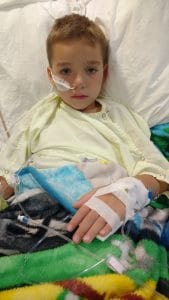Montreal doctors find new treatment for children with Crohn’s disease, provides some relief

Posted March 31, 2022 10:22 am.
Last Updated March 31, 2022 6:49 pm.
Montreal doctors at Sainte-Justine Hospital are hopeful. They say research shows a new treatment for Crohn’s disease is keeping children out of the pediatric hospital.
The treatment avoids more reoccurring disease flare-ups and improves long-term health in patients.
“In that study, the relapse rate is much lower than in the past,” said Dr. Prevost Jantchou, pediatric gastroenterologist, Sainte-Justine Hospital. “We believe that those are very important results that can help us understand how we can better treat the patients.”
Inflammatory Bowel Disease (IBD) – like Crohn’s and Colitis – inflames the lining of the gastrointestinal tract, stopping the body from digesting food, absorbing nutrition and eliminating waste in a healthy way. This causes stomach pain, cramping, severe diarrhea, weight loss and more.
“The delay in diagnosis remains an important issue because it determines the way the disease evolves so when we have those symptoms we always want to eliminate infectious bowel disease because it’s more prominent than IBD but if we have red flags and kids don’t grow very well or have some sort of anemia we’ll be very fast to go to a colonoscopy,” Dr. Jantchou.
Mikael Carpentier, 10, is one of over 7,000 Canadian children that was diagnosed with the disease.
His mother says at his worst point he had a fever every single night, was unable to digest food, stay awake in class or play with friends.
“I couldn’t even go to the kitchen to get myself something, I was doing nothing, sometimes I could go to school but often I couldn’t,” said Mikael in French.
After countless hospital visits across the province and even Ontario, Carpentier landed at Sainte-Justine where he was hospitalized for 30 days.
“He has over 50 ulcers from his mouth all the way down to his anus and over 30 swollen lymph nodes in his stomach. His diagnosis was extremely severe,” explained Mikael’s mother Stéphanie d’Attilio in French.

(CREDIT: Stéphanie d’Attilio / handout)

(CREDIT: Stéphanie d’Attilio / handout)
Since working with Dr. Jantchou, Mikael had a tough first year on the treatment Remicade – the monoclonal antibody therapy medically known as anti-TNF-alpha. However, he is feeling better than he’s ever felt.
Mikael receives treatment around every five weeks.
“When I get out of treatment I feel good my mom thinks I’m full of energy,” said Mikael.
“When we use the medication the TFN-alpha here when we use it very early so at the time of diagnosis we see that the relapse is slower here in red we have patients who are exposed very early to the medication and in blue are the ones who received other medication before so the difference is 20 per cent of the rate of relapse and the time of relapse is shorter of the time of taking the medication,” explained Dr. Jantchou.
According to Crohn’s and Colitis Canada, in the last decade, the prevalence of Crohn’s and colitis in Canadian children has risen more than 50 per cent.
The cause of the disease is unknown and there’s still no cure.








